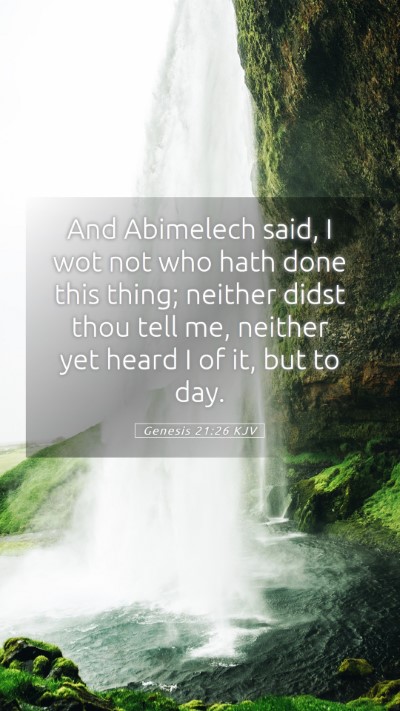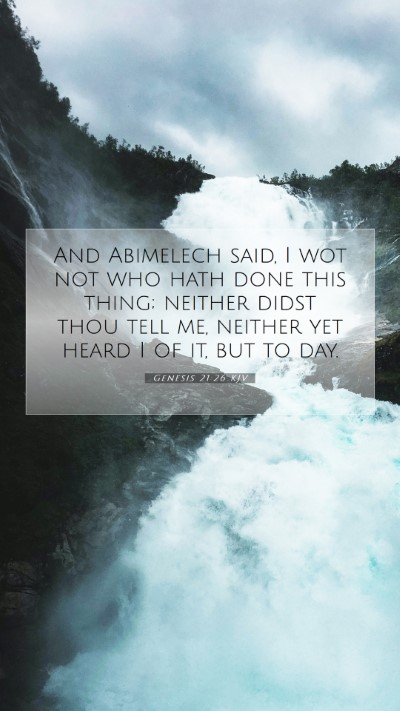Bible Verse Commentary on Genesis 21:26
Verse: Genesis 21:26 states, "And Abimelech said, 'I do not know who has done this thing; you did not tell me, nor did I hear of it until today.'" This verse captures a moment of diplomatic communication and misunderstanding between Abimelech and Abraham regarding the well of water.
Understanding Genesis 21:26
This verse serves as a pivotal point in the account of Abraham's interactions with Abimelech, the king of Gerar, set within the narrative of God's covenant with Abraham. It highlights themes of trust, communication, and the consequences of misunderstandings.
Key Themes and Insights
- Communication and Relationships: Abimelech’s declaration of ignorance reveals a misunderstanding that can strain relationships. Effective communication is vital in addressing grievances and misunderstandings.
- The Importance of Clarity: The lack of prior information results in a diplomatic crisis, suggesting that clarity and honesty are essential in dealings with others, especially in matters of dispute.
- Divine Oversight: This incident illustrates the providence of God, as misunderstandings can lead to divine purposes being fulfilled, including the protection of Abraham and the continuation of God’s promises.
Commentary Insights
Matthew Henry: In his commentary, Henry emphasizes the significance of how misunderstandings can lead to complications. He notes that Abimelech, an otherwise just and good king, is put in a position of conflict due to a lack of knowledge, underscoring the unforeseen consequences of failing to communicate.
Albert Barnes: Barnes suggests that this moment shows how individuals can be caught unaware in moral and social conflicts, highlighting the necessity for all parties to engage openly to prevent disputes. His analysis draws attention to the broader implications of this narrative in the lives of the patriarchs.
Adam Clarke: Clarke goes further by mentioning the historical context and the cultural norms surrounding treaties and covenants. He discusses how Abimelech's response reflects a king's duty to maintain peace in his realm, showcasing the delicate balance between personal and political interests.
Application and Reflections
For readers seeking to apply the lessons of Genesis 21:26, several considerations emerge:
- Encourage Open Dialogue: Readers are reminded to foster a culture of transparency and open communication in their own relationships, whether personal, professional, or communal.
- Seek Understanding: Before forming judgments or conclusions about others' intentions, it is crucial to seek understanding and learn the full context of situations.
- Trust Divine Plan: Even when misunderstandings occur, believers can trust in God’s plan, knowing that He can work through circumstances to achieve His purposes.
Related Scripture Cross References
- Genesis 20:12 - Abraham's earlier interactions with Abimelech.
- Genesis 21:25 - The context of the well that Abraham dug.
- Proverbs 18:13 - The importance of listening before responding.
Conclusion
Genesis 21:26 serves as a poignant reminder of the complexities inherent in human relationships and the need for clarity and understanding. By analyzing the verse through various commentaries, we gain deeper insights into its meaning and modern-day applications. As we study Scripture, let us strive for open communication and trust in God’s overarching plan, as highlighted in this narrative.


